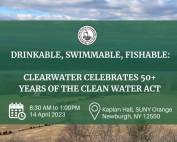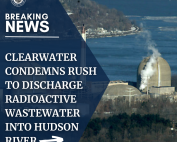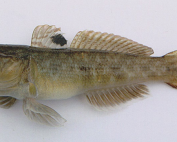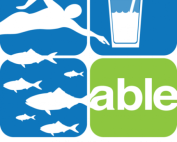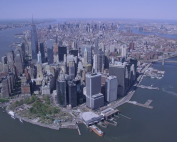For more than half a century, Clearwater has worked to protect the Hudson River through grassroots organizing in waterfront/Hudson Valley communities. Over the years Clearwater has been instrumental in advocating for the closure and now for the safe decommissioning of the Indian Point Nuclear Power Plant, for a comprehensive cleanup of General Electric’s legacy polychlorinated biphenyls (PCBs) pollution, and countless other campaigns that protect the Hudson River and the well-being of the residents on its shores.
Clearwater remains committed to our mission to protect the Hudson River, and to our efforts to raise public awareness of the issues threatening the river. We believe an educated and engaged citizenry is a powerful force for change.
Request a speaker from Clearwater
Stand up for the Hudson River – Ways to take action:
Protect the Hudson River from Aquatic Invasive Species: Ask Governor Hochul to stop invasive species from entering the Hudson River through the Erie Canal. Learn more and take action!
Clearwater’s Advocacy Priorities (2024-2025)
PCBs
Between 1947-1977 General Electric discharged over one million pounds of toxic polychlorinated biphenyls (PCBs) into the Hudson River, creating one of the largest Superfund Sites in the United States. PCBs take decades to break down and have accumulated in the sediment, water, and wildlife posing risks to ecological and human health. A review of the Superfund cleanup is due every 5-years, including a report on how successful the cleanup remedy has been, known as a Protectiveness Determination. Clearwater will be carefully watching this process along with our partners Friends of a Clean Hudson, and will keep the public engaged and informed. Learn more about General Electric’s polychlorinated biphenyls (PCBs) contamination of the Hudson River.
Indian Point
After decades of grassroots advocacy and legal action by Clearwater and our partners, the last reactor at the Indian Point Nuclear Power Plant closed in April 2021. In collaboration with the Indian Point Convergence, Clearwater successfully championed the creation of a Decommissioning Oversight Board to oversee the decommissioning of the facility. Clearwater continues to be an active advocate and ally to the community striving to ensure the safest decommissioning possible. Learn more about our work on Indian Point.
Newburgh PFAS Drinking Source Water Contamination
The City of Newburgh’s drinking water source, Washington Lake was contaminated with Per- and poly-fluoroalkyl substances (PFAS) from firefighting foam runoff from Stewart Air National Guard Base. PFAS has been linked to increased cholesterol, increased risk of high blood pressure in pregnant women, decreased infant birth rates, and heightened risks of kidney or testicular cancer. Since May 2, 2016, the City of Newburgh has received drinking water from alternative sources, though PFAS-contaminated Washington Lake remains the permanent drinking water source for the City of Newburgh. Clearwater is a member of the Restoration Advisory Board and joins the community in advocating for timely remediation of Washington Lake. Learn more about Newburgh’s drinking source water contamination.
New York State Canal System + Invasive Species
The Erie Canal and Mohawk River have become a thoroughfare for invasive species to enter the Hudson River from the Great Lakes. A recent example is the round goby – native to Eurasia, gobies are voracious feeders, reproduce rapidly, and compete with native species for food, habitat, and spawning areas. The spread of non-native species into the Hudson through the canal is not a new occurrence, and unless swift action is taken, it will not be the last. On the horizon are species including invasive carp, which are populous in the Mississippi watershed and on the doorstep of the Great Lakes Watershed. Once there, they could follow the goby’s route to the Hudson.
Swimmable Hudson
Clearwater was an instrumental force in the initial passage of the Clean Water Act in 1972, which established goals of zero water pollution discharges by 1985 and for all U.S. waters to be swimmable and fishable by 1983. Nearly 40 years later, the Hudson River ecosystem and swimmability are improving, but discharges continue, the river is not always safe for swimming and significant fish consumption advisories remain in place. Clearwater will continue to support efforts to improve water quality and quicken progress toward CWA goals, through advocacy, education, and amplifying the desire of communities to fish and swim in the Hudson River safely.
For more information about Clearwater’s Environmental Action work, contact Jen Benson, Environmental Action Director at jen@clearwater.org.
Help us continue our efforts to protect the Hudson River. Support Clearwater’s Environmental Action efforts.
Recent blog posts
The Clean Water Act Symposium
Drinkable, Swimmable, Fishable: Clearwater Celebrates 50+ Years of the Clean Water Act A Symposium on the Clean Water Act NEWBURGH, NY - On Friday, April 14, Clearwater hosted a symposium on the Clean Water Act, [...]
Environmental Action Update April 2023
April 2023 EA E-News Update Clean Water Act Symposium: In honor of the 50th anniversary of the Clean Water Act, Hudson River Sloop Clearwater is hosting a symposium, Drinkable, Swimmable, Fishable: Clearwater Celebrates 50+ Years [...]
Action Alert – Help Stop The Release of Radioactive Water Into the Hudson
CLEARWATER CONDEMNS RUSHED PLAN TO DISCHARGE RADIOACTIVE WATER INTO HUDSON RIVER (Photo by Mario Tama/Getty Images) This week, Holtec accelerated their timeline for discharging radioactive wastewater -- up to 45,000 gallons from [...]
Action Alert: Aquatic Invasives and the Erie Canal
Take Action: Protect the Hudson River from Aquatic Invasive Species! Ask Governor Hochul to take action to stop invasive species from entering the Hudson River through the Erie Canal. The Erie Canal and Mohawk River [...]
Clearwater Comments on the Draft Integrated Feasibility and Tier 1 Environmental Impact Statement for the US Army Corps of Engineers NY & NJ Harbor & Tributaries Focus Area Feasibility Study (HATS)
The Hudson River Sloop Clearwater recently submitted comments on a proposal from the US Army Corps of Engineers to protect the NYNJ Harbor and upriver areas from storm surge in response to the devastation caused [...]
Environmental Action Update March 2023
March 2023 EA E-News Update Register to attend: Clearwater’s upcoming symposium: Swimmable, Fishable, Drinkable: 50 Years of the Clean Water Act WHEN: 9am-1pm, Friday, April 14 WHERE: Kaplan Hall, SUNY Orange, Grand St., Newburgh, NY [...]
Environmental Action Update February 2023
February 2023 EA E-News Update Public Health and Safety Impacts of Decommissioning Indian Point: On January 26 Grassroots Environmental Education, Clearwater and the United for Clean Energy Convergence hosted the first in a series of [...]
Environmental Action Update January 2023
Happy New Year! In the final days of 2022, Governor Hochul signed several important bills into law, which will have lasting impacts on the waters of the Hudson Valley and communities across the region and [...]

